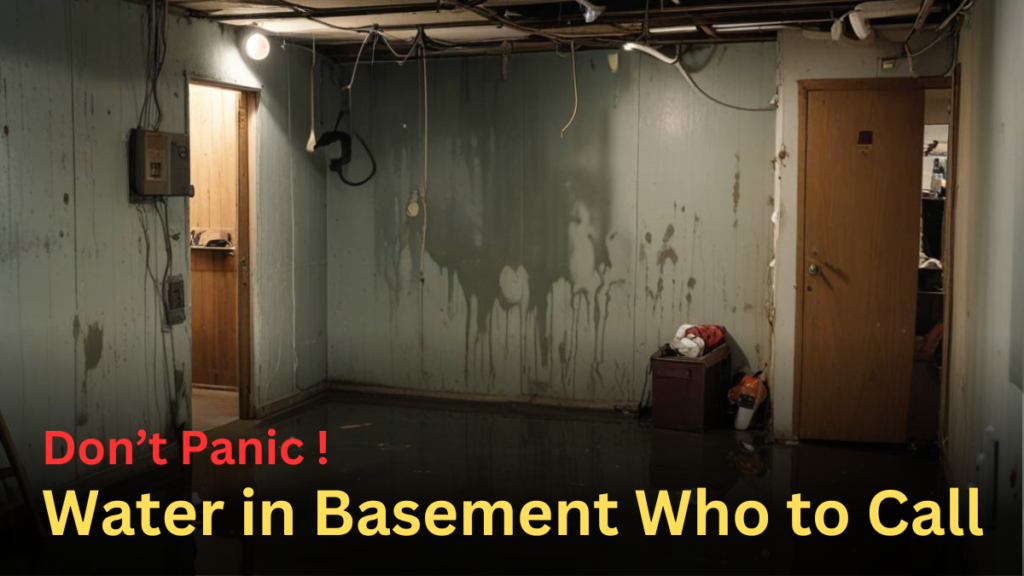When faced with the unsettling discovery of Water in Basement Who to Call, it’s natural to feel overwhelmed. Whether the cause is a sudden storm, a burst pipe, or a slow leak, the presence of water in the basement can lead to extensive damage if not addressed promptly. But the pressing question remains: Water in basement who to call? In this comprehensive guide, we will explore the steps to take, the professionals to contact, and how to prevent future issues. We’ll also address the popular query, water in basement who to call near me, ensuring you have all the necessary information to protect your home.
Table of Contents
Understanding the Problem: Why is There Water in Your Basement?

Before diving into the solution, it’s important to understand why Water in Basement Who to Call and What to Do occurs. There are several common causes, each requiring a different approach:
1. Poor Drainage Systems:
If your home’s drainage system isn’t functioning properly, it can lead to water in the basement. This issue is often caused by clogged gutters, downspouts that are too close to the foundation, or sloping ground that directs water toward the house.
2. Cracks in the Foundation:
Over time, the foundation of your home may develop cracks. These cracks can allow water in the basement, especially during heavy rains. Even small cracks can lead to significant problems if left unchecked.
3. Sump Pump Failure:
A sump pump is designed to prevent water in the basement by pumping it out before it can accumulate. If the pump fails, the basement can flood quickly, especially during storms.
4. Sewer Backup:
A backed-up sewer can lead to water in the basement. This is not only a mess but also a health hazard, as the water can be contaminated with waste.
5. Leaking Pipes:
Pipes that run through the basement can develop leaks, leading to water in the basement. This can be due to age, corrosion, or sudden damage.
Once you understand the cause, the next step is to determine Water in Basement Who to Call to address the issue.
FintechZoom Best Credit Cards: Your Go-to Guide in 2024
Water in Basement: Who to Call?

When you find water in the basement, the first step is to stop the water from causing more damage. But Water in Basement Who to Call? Depending on the cause of the water, different professionals may be needed. Here’s a breakdown:
1. Plumber:
If the water in the basement is due to a burst pipe, leaking pipes, or a backed-up sewer, a plumber should be your first call. Plumbers are equipped to handle pipe repairs, unclog drains, and fix issues with your home’s plumbing system.
2. Waterproofing Specialist:
For issues related to foundation cracks, poor drainage, or chronic moisture problems, a waterproofing specialist is the professional to call. They can assess your home’s vulnerabilities and recommend solutions like sealing cracks, installing drainage systems, or applying waterproof coatings.
3. Sump Pump Technician:
If the water in the basement is due to sump pump failure, you’ll need to call a sump pump technician. They can repair or replace the sump pump, ensuring it functions properly to keep your basement dry.
4. Restoration Company:
In cases of significant flooding, a restoration company can be crucial. They specialize in removing water, drying out the basement, and preventing mold growth. They also help restore any damaged areas, returning your basement to its original condition.
5. Insurance Adjuster:
If the water in the basement has caused extensive damage, it’s wise to contact your home insurance company. An adjuster can assess the damage and help you understand what’s covered by your policy. They’ll guide you through the process of filing a claim and getting compensation for repairs.
6. Local Authorities:
In extreme cases, such as a major flood that affects the entire neighborhood, it may be necessary to contact local authorities or emergency services. They can provide assistance and resources to help manage the situation.
Water in Basement Who to Call Near Me?

When dealing with Water in Basement Who to Call, finding a local professional is often a priority. A quick search for water in basement who to call near me can provide a list of nearby experts. But how do you choose the right one?
1. Check Reviews and Ratings:
Look for companies with strong reviews and high ratings. This indicates a history of good service and satisfied customers. Sites like Google, Yelp, and the Better Business Bureau are good places to start.
2. Ask for Recommendations:
If you’re not sure who to call, ask friends, family, or neighbors if they’ve dealt with a similar issue. Personal recommendations can often lead you to trustworthy professionals.
3. Verify Credentials:
Ensure that the professional you choose is licensed, insured, and has the necessary certifications to handle water in the basement issues. This is especially important for plumbers, waterproofing specialists, and restoration companies.
4. Get Multiple Quotes:
Before making a decision, it’s wise to get quotes from several companies. This not only gives you an idea of the cost but also helps you gauge the professionalism and responsiveness of each company.
5. Emergency Services:
If the situation is urgent, look for companies that offer 24/7 emergency services. Water in Basement Who to Call can quickly escalate, so having a professional who can respond immediately is crucial.
Steps to Take Before Help Arrives

Water in Basement Who to Call, While waiting for the professionals to arrive, there are several steps you can take to minimize damage and ensure your safety:
1. Turn Off the Power:
If there’s Water in Basement Who to Call, and it’s near electrical outlets or appliances, turn off the power to the basement. Water and electricity are a dangerous combination, and it’s better to be safe.
2. Stop the Water Source:
If the water in the basement is due to a leak or burst pipe, try to stop the water at its source. This might involve turning off the main water supply or using a bucket to catch dripping water.
3. Move Valuables:
Remove any valuable items from the basement, especially those that could be damaged by water. This includes electronics, furniture, and important documents.
4. Use a Wet/Dry Vacuum:
If you have a wet/dry vacuum, you can start removing some of the water. However, only do this if it’s safe and the water level is low. For deep water, it’s best to wait for professionals.
5. Ventilate the Area:
If possible, open windows and doors to allow air circulation. This can help reduce humidity and prevent mold growth.
Preventing Future Water Issues in the Basement

Once the immediate issue of Water in Basement Who to Call is resolved, it’s important to take steps to prevent future problems. Here are some strategies to keep your basement dry:
1. Install a Sump Pump:
If you don’t already have one, consider installing a sump pump. This device automatically pumps water out of the basement, preventing flooding.
2. Regular Maintenance:
Have your plumbing, sump pump, and drainage systems inspected regularly. This can catch small issues before they become major problems.
3. Improve Drainage:
Ensure that your home’s drainage system is effective. This might involve cleaning gutters, extending downspouts, or regrading the landscape around your home to direct water away from the foundation.
4. Seal Cracks:
Inspect your foundation for cracks and seal them as soon as they appear. Even small cracks can let in water in the basement, leading to bigger issues down the road.
5. Waterproofing:
Consider professional waterproofing for your basement. This can include applying sealants, installing vapor barriers, or using a waterproofing membrane to protect against moisture.
6. Monitor Humidity:
Keep an eye on the humidity levels in your basement. Using a dehumidifier can help control moisture and prevent the growth of mold and mildew.
Cost Considerations: What to Expect

Addressing Water in Basement Who to Call can be costly, depending on the severity of the problem and the solutions needed. Here’s a rough estimate of what you might expect:
1. Plumber:
Repairing a burst pipe or fixing leaks can range from $150 to $500, depending on the complexity of the job.
2. Waterproofing Specialist:
Sealing cracks and waterproofing the basement can cost between $2,000 and $10,000, depending on the size of the basement and the extent of the work needed.
3. Sump Pump Installation:
Installing a sump pump can range from $1,000 to $3,000, including the cost of the pump and installation.
4. Restoration Services:
For major water damage, restoration services can range from $2,000 to $10,000 or more, depending on the extent of the damage and the size of the basement.
5. Insurance Deductibles:
If you’re filing an insurance claim, be prepared to pay your policy’s deductible, which can range from $500 to $2,500 or more.
Final Thoughts: Being Prepared for Water in the Basement
Discovering Water in Basement Who to Call is a stressful experience, but knowing Water in Basement Who to Call and what steps to take can make all the difference. Whether it’s a small leak or a major flood, addressing the issue promptly and effectively is key to minimizing damage and preventing future problems.








Pingback: The Ultimate Guide to Water Extractors: 7 ultimate steps You Need to Know - Solvinsight